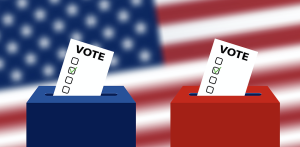As we inch ever closer to the 2024 US election, employers cannot ignore its impact on workplace dynamics.
According to a recent survey we conducted, a significant nearly one in five employees said that the current election season was distracting them from their job.
If this wasn’t indicative enough of the fact the upcoming election is a major distraction, other data (see below), suggests that as polling day looms, employers really do need to take seriously the weight of the election on employees.
But what can employers realistically do in these remaining final days??

Take steps to address tensions and remind staff about voting leave
I would argue CHROs need to take proactive steps in two main areas to address rising political tensions in the workplace.
Firstly, employers need to review and refresh the tools they have to maintain morale during an election cycle. In particular, this includes setting clear rules on employee conduct, creating civility expectations for employees that might otherwise lead to an employee feeling targeted.
Secondly they need to communicate to employees their company rules on voting leave. Voting leave policies can be valuable assets to employers, demonstrating legal compliance and a commitment to civic engagement, among other benefits.
Let’s look at each of these in more detail:
Promoting civility when everyone has a (political) opinion
Elections tend to amplify discussions on civility and politics at the workplace, but this election season is particularly divisive.
Well-written, consistently applied, and enforced policies clarify an organization’s expectations about employee conduct.
Given that employees typically support rules for political conduct (51% believe their workplace should have policies that manage political conversations), employers should use the remaining time they have before polling day to review and refresh existing policies. These includes rules around code of conduct, harassment, discrimination, attire, and workspace decorations policies, to ensure that they apply to politically charged conduct.
These policies should promote better civility and minimize opportunities for heated political arguments (or worse) at work without inviting the challenges of a policy that specifically monitors political speech and expression.
Some employers may instead choose the latter approach, which has the benefit of emphasizing politics in the workplace, but introduces challenges, including, for one, consistent application and enforcement.
After all, what’s political to one person may not seem political to another.
The best approach for each employer will vary, but either way, training is critical to ensure that policies have a meaningful impact.
The most carefully drafted policy carries little weight if an organization does not adequately train HR and mangers on enforcement or clearly communicate the policy to employees.
Enhancing morale through voting leave
In addition to managing employee conduct, employers need to stay compliant with voting leave laws.
According to a Brightmine survey, 67% of organizations find it challenging to stay compliant with state laws.
With the upcoming election, eyes are on voting leave. It’s essential that employers understand the voting leave laws that apply in their jurisdictions.
While some states require employers to provide a set amount of time off to vote, other states do not create a leave entitlement but instead prohibit intimidation and retaliation related to voting.
Just like other leave laws, employers must carefully monitor voting leave developments to ensure they catch any changes applicable to upcoming elections.
Even in states where voting leave is not required, offering time off to vote can help boost morale on multiple fronts.
Morale plays a critical role in a company’s recruitment, retention, productivity, and reputation.
While a voting leave policy may not look exactly the same for different types of employers, if allowing time off to vote can improve key components of company success, then it’s likely worth the hassle.
Plus, allowing employees time off to vote demonstrates to both employees and the public a commitment to civic engagement.
It aligns with the growing expectation that employers should welcome employees’ whole selves to the workplace, a concept particularly popular with younger generations, the future of the workforce.
A voting leave policy can also help level the playing field among employees within an organization.
While a more senior employee may feel comfortable asking for a short period of time off to vote on Election Day in the absence of a voting leave policy, a newer or less senior employee may not be comfortable doing so if the company has not raised the subject.
Similar to the important role of HR and managers when it comes to policies on civility, thoughtful communication strategies are essential for implementing voting leave policies.
HR leaders can organize informational sessions, create accessible resources such as FAQs and brochures, and provide open forums where employees can safely ask questions without fear of retribution.
These efforts demonstrate a company’s genuine commitment to supporting employees who need time to vote, further fostering the type of employee-friendly reputation that leads to better business outcomes.
Preparation pays off on election day – and beyond
With Election Day fast approaching, employers have a unique opportunity to evaluate current policies and practices when it comes to civility and voting leave, filling in gaps where needed.
Implementing well-defined policies, effectively training HR and managers, and prioritizing clear communication to employees can help organizations maintain a work environment where employees are respectful and productive, even throughout the taxing 2024 election season.
